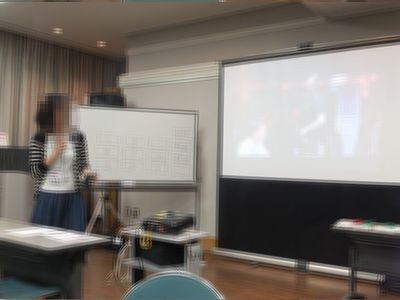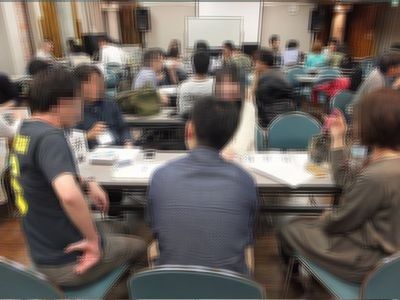1.マテリアルの紹介 Tさん

2.ディスカッション中の様子

:::::::::::::::::::::::::::::::::::::::::::::::::::::::::::::::::::::::::::::::
《 今回のworkshop 》
○workshop参加人数:58名(うち新人の方:9名)
○【前半】:Playing video game by yourself or to an audience
○【後半】:Refugee crisis and their life in host country
:::::::::::::::::::::::::::::::::::::::::::::::::::::::::::::::::::::::::::::::::
みなさまこんばんは、E’s club幹事のKです。
4月8日(土) 開催の第148回workshopの詳細をお送りいたします。
今回は前半のマテリアルをTさん、 後半のマテリアルをMさんにご作成いただきました。
前半は”Playing video game by yourself or to an audience”、後半は”Refugee crisis and their life in host country” というタイトルでそれぞれディスカッションを行います。
前半と後半のリンク先には図表と動画がありますので、
事前に閲覧ならびに視聴をお願いいたします。( 動画の長さは6分16秒と3分46秒です。)
[今週のマテリアル]
≪FIRST HALF≫
Playing video game by yourself or to an audience
Have you ever watched someone playing video game at a live streaming services, like YouTube?
Nowadays it’s getting more popular that having your own channel and some people enjoy broadcasting themselves playing a video game. There are also some special streaming platforms for gamers: YouTube Gaming, Hitbox.tv, Mirrativ, and our Editors’ Choice, Twitch.
In addition, playing video games becomes like sports, called Esports. Esports is kind of competitions that professional gamers play video games with others. The audience for Esports need tickets as same as other popular sports. And the market size is getting bigger and bigger.
http://www.pcmag.com/article/ 342888/twitch-and-beyond-the- best-video-game-live- streaming-servic
https://venturebeat.com/2016/ 01/25/esports-market-to-grow- 43-to-465m-in-2016-and-reach- 1-1b-by-2019/
1. Do you often play video games?
2. If so, which platform do you use? PS4, Nintendo switch, smart phone, etc. If not, why?
3. What kind of video games do you like? And why? Puzzle, Action, RPG etc.
4. Do you think you can enjoy watching someone playing video games than playing yourself?
5. If you were a very good player of video games, do you create your own channel for broadcasting? Why or why not?
6. Have you ever watched Esports competitions? If not, do you wanna watch even if you have to buy tickets?
7. Do you think Esports become more popular? Why or why not?
≪LATTER HALF≫
<Introduction>
By the end of 2015, over 65 million people worldwide were displaced from their homes by conflict and persecution – increased from 37 million ten years ago, and the highest number seen in decades. The tally for the year included 40.8 million people internally displaced by conflict, violence and human rights violations, over 21 million refugees, 1 and more than three million asylum-seekers.
The conflict in Syria continues to be by far the biggest driver of migration. But the ongoing violence in Afghanistan and the conflict in Somalia are also leading people to look for new lives elsewhere.
More than a million migrants and refugees crossed into Europe in 2015, sparking a crisis as countries struggled to cope with the influx, and creating division in the EU over how best to deal with resettling people.
The world needed to come together and act as a united front in order to deal with the crisis, but instead, national policies have become more divided. Many states downright refused to take in any refugees, leaving the Border States alone in their struggle. The vast majority of Syrian refugees reside now in camp in the neighboring countries. Turkey, Lebanon, Jordan, Iraq and Egypt are taking care of ninety-five percent of them. While the Arab states of the Persian Gulf together have accepted 0 Syrian refugees. The EU states also vary their refugee policy from state to state.
Donald Trump, U.S. President signed an executive order halting all refugee admission and temporarily barring people from seven Muslim-major countries on 27 January.
Meanwhile, Japan had 7,586 applications for asylum and granted refugees status only 27 in 2015. Prime Minister Shinzo Abe told reporters at the U.N. General Assembly in 2015 that Japan must first tackle the refugee crisis posed by its falling birth rate, an aging population, and pushing to boost the number of women in the labor market. He pledged $2.8 billion in aid for refugees and migrants over three years from 2016, though Japanese government doesn’t intend to accept more number of refugees.
<Agenda>
Refugee crisis and their life in host country
<Questions>
1. Please share your acquaintances about the refugee crisis.
2. Why do you think many states refuse to take in any refugees?
3. What kind of troubles refugees may cause in host country.
4. What kind of troubles refugees may face in host country.
5. Do you think Japanese refugee policy is right? Please share pro and con.
6. Is it possible for migrants including refugees to vitalize Japanese economy and society?
7. What can we provide for migrants so that they can live a secure life in Japan?
<Reference 1>
http://www.unhcr.org/news/ stories/2017/2/589c33054/ syrian-refugees-breathe-new- life-shrinking-german-village. html
Syrian refugees breathe new life into shrinking German village
When school sizes began to shrink in the tiny village of Golzow, Syrian refugees saved it from decline.
By: Josie Le Blond and Gordon Welters in Golzow, Germany | 9 February 2017 |
In 2015, a group of Syrian refugee children saved a famous German school from disaster and breathed new life into a shrinking village. Nearly two years later, they’ve become an indispensable part of community life.
“It was no life there in Syria, we were all so scared all of the time. I just wanted peace, nothing else,” says Syrian refugee Halima Taha, 30, who fled the war at home four years ago with her husband and three children. Arriving in Germany, they volunteered to move to Golzow, a tiny village on the German-Polish border.
At the time, Halima had no idea what her family’s arrival meant to the villagers. Back then, the village’s shrinking population was bad news for Golzow’s primary school, known by film fans the world over as the setting for ‘The Children of Golzow’, an epic 42-hour documentary filmed over five decades.
Yet the school’s fame wasn’t enough to save it from the effects of a creeping decline. Over the space of eight years, Golzow’s population shrank by 12 per cent, to just 835 people. Then, in March 2015, the unthinkable happened. For the first time since it opened in 1961, the school failed to make up the pupil numbers required for a reception class.
“It was no life there in Syria, we were all so scared all of the time.”
“A lot of people have moved away in recent years,” explains school headmistress Gabi Thomas. “There just weren’t the young parents having children who would go to the school. Activity and life is very important in a rural region, and that is brought in by children.”
The community was distraught, fearing the beginning of the end for their beloved school. That is until Golzow’s mayor Frank Schutz came up with an inspired solution. He would ask local authorities to find refugee families with primary school-age children who might want to move into one of Golzow’s many empty apartments. “It was an added advantage that we were helping someone who is actually helping us as well,” says Mayor Schutz.
Sixty kilometers away, Halima and her young family had just arrived in Brandenburg’s main reception center at Eisenhuttenstadt, utterly exhausted after a grueling three and a half years on the road from Syria to Germany. When they were asked if they’d like to move into a donated apartment in a nearby village, they jumped at the chance.
“We didn’t mind what kind of place we went to, as long as it was clean, with good people,” says Halima. “We thought, why not?” Months later, Halima, her family and another Syrian family arrived in Golzow, bringing with them six much-needed school-age children in time for the new school year.
Although they were a little older than their classmates, three young newcomers joined the reception class, pushing numbers over the required minimum of 15. It was win-win – the year group was saved and the Syrians got a new home.
Nearly two years on, one of the schools’ rescuers, Halima’s 10-year-old daughter Kalama, has adjusted quickly into her new life. “Lots of things are different here, of course,” she says, surrounded by a group of German school friends in a break between lessons.
Though Kamala and her family are Muslims, Kalama said she’s enjoyed learning about German customs. “In Syria, we never celebrated Christmas or Easter or Halloween,” she adds, in near-fluent German. “I like Easter best because we get to hunt for chocolate eggs.”
Kamala is a bright pupil and has now been promoted from her introductory reception class up into the third grade, where her favorite subjects are maths, music and sport. Outside of school, she finds plenty to keep her occupied, playing badminton with friends in the village after-school club, or learning to ride her next-door neighbor’s ponies.
“I like Easter best because we get to hunt for chocolate eggs.”
“They want to know about us and we want to know about them,” says Kamala of her German classmates. “There’s so much to tell and explain. Sometimes I translate for the others into Arabic or German.”
Like their daughter, Kalama’s parents Halima and Fadi are so settled that they often act as go-betweens between newcomers and locals. Last February, they helped welcome a third Syrian family to Golzow.
“We helped them a lot, when they didn’t know where stuff was or how things worked,” says Halima, who believed it was the least they could do given the welcome they had received from villagers.
“Everyone came to welcome us here with flowers,” recalls Halima. “I was so surprised, I couldn’t do anything but cry. If more families come, they’d be very welcome. Golzow is very open, it’s a very small village and the people are very beautiful.”
Halima and her family now have refugee status and a visa allowing them to live and work in Germany for the next three years. Halima works part time as an Arabic interpreter for a German charity that helps asylum-seekers. Meanwhile, Fadi is looking for work and is practicing for his German driving test. He also enjoys fishing and tending his allotment garden with his neighbors.
Even so, for all their hard work fitting into village life, Fadi and Halima still miss their old lives. “It can be difficult,” says Fadi, 40, who ran a real estate business at home in Latakia. “We had a good life in Syria. But then the war came and we had to leave. Now we are trying to have a good life again. We all help each other here. Golzow is a second family for us. But of course, all we want is the bloodshed in Syria to stop so we can go home again.”
“I’d like that my children and I can return to Syria one day,” agrees Halima. “Home is home, after all. While we wait, the children must learn, study and get good careers. At least here we are safe.”
<Reference 2>
http://www.bbc.com/news/world- europe-34131911
<Reference 3>
https://www.youtube.com/watch? v=RvOnXh3NN9w
<Reference 4>
https://www.youtube.com/watch? v=m_7dGLLL0ew
***********************************************************
私たちと一緒に英語コミュニケーション能力を鍛えませんか?
ご興味を持たれた方は、
入会申込フォーム
https://english-speaking-club.com/cms/?page_id=93
よりお申し込みください。お待ちしています!
***********************************************************